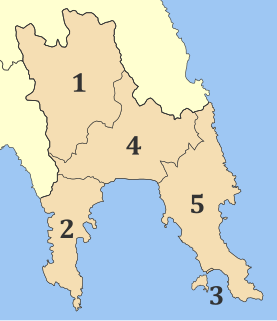Pythagoras of Laconia was an ancient Greek athlete listed by Eusebius of Caesarea as a victor in the stadion race of the 16th Olympiad (716 BC). [1]

Laconia is a region of Greece in the southeastern part of the Peloponnese peninsula. Its administrative capital is Sparta. The word laconic is derived from the name of the region by analogy—to speak in a concise way, as the Spartans were reputed by the Athenians to do.

The Ancient Greek language includes the forms of Greek used in Ancient Greece and the ancient world from around the 9th century BCE to the 6th century CE. It is often roughly divided into the Archaic period, Classical period, and Hellenistic period. It is antedated in the second millennium BCE by Mycenaean Greek and succeeded by medieval Greek.

Stadion or stade was an ancient running event, part of the Ancient Olympic Games and the other Panhellenic Games. It was one of the five major Pentathlon events. It was the premier event of the gymnikos agon.
He was the first Spartan winner of the stadion race, but his crown was not the first Lacedaemonian victory, because Acanthus of Sparta won the diaulos and the dolichos four years earlier.

Sparta was a prominent city-state in ancient Greece. In antiquity the city-state was known as Lacedaemon, while the name Sparta referred to its main settlement on the banks of the Eurotas River in Laconia, in south-eastern Peloponnese. Around 650 BC, it rose to become the dominant military land-power in ancient Greece.
Acanthus the Lacedaemonian, was the victor in two footrace events, the diaulos (δίαυλος) and dolichos (δόλιχος), in the Olympic Games of 720 BC. He was also, according to some accounts, the first who ran naked in these games. Other accounts ascribe this to Orsippus the Megarian. Thucydides says that the Lacedaemonians were the first who contended naked in gymnastic games, although he does not mention Acanthus by name.
Diaulos was a double-stadion race, c. 400 metres , introduced in the 14th Olympiad of the ancient Olympic Games.
According to Plutarch, Pythagoras later met the Roman king Numa Pompilius to introduce some Spartan influence on early Roman society. [2]

Plutarch, later named, upon becoming a Roman citizen, Lucius Mestrius Plutarchus, was a Greek biographer and essayist, known primarily for his Parallel Lives and Moralia. He is classified as a Middle Platonist. Plutarch's surviving works were written in Greek, but intended for both Greek and Roman readers.

Rome is the capital city and a special comune of Italy. Rome also serves as the capital of the Lazio region. With 2,872,800 residents in 1,285 km2 (496.1 sq mi), it is also the country's most populated comune. It is the fourth most populous city in the European Union by population within city limits. It is the centre of the Metropolitan City of Rome, which has a population of 4,355,725 residents, thus making it the most populous metropolitan city in Italy. Rome is located in the central-western portion of the Italian Peninsula, within Lazio (Latium), along the shores of the Tiber. The Vatican City is an independent country inside the city boundaries of Rome, the only existing example of a country within a city: for this reason Rome has been often defined as capital of two states.

Numa Pompilius was the legendary second king of Rome, succeeding Romulus. He was of Sabine origin, and many of Rome's most important religious and political institutions are attributed to him.
